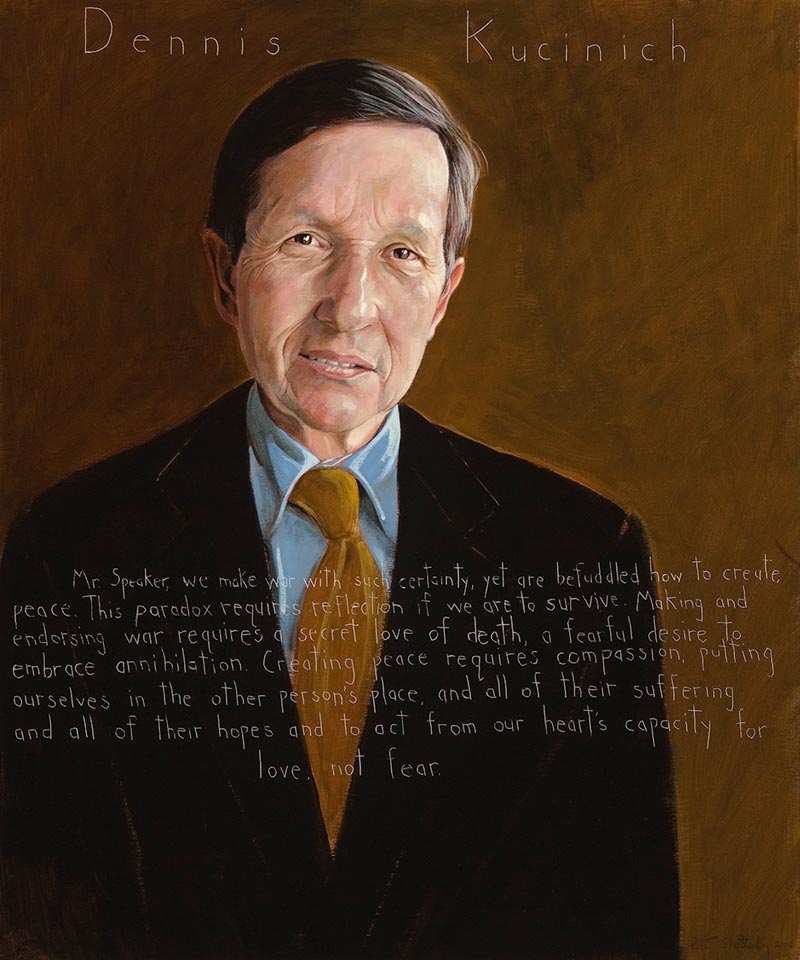
Dennis Kucinich
Former US Congressman, Presidential Candidate : b. 1946
“Mr. Speaker, we make war with such certainty, yet we are befuddled how to create peace. This paradox requires reflection if we are to survive. Making and endorsing war requires a secret love of death, and a fearful desire to embrace annihilation. Creating peace requires compassion, putting ourselves in the other person’s place, and all of their suffering and all of their hopes and to act from our heart’s capacity to love, not fear.”
Biography
Dennis Kucinich, former Democratic Congressman from Ohio and two-time candidate for President, is an advocate for peace and a greener, healthier world. That he has carved out a successful political career holding true to these values is a remarkable achievement.
Kucinich’s early life and career were lessons in persistence and hard work. He grew up in a large family that was constantly on the move, searching for affordable housing; occasionally they had to live out of the family car. Kucinich began his political career by running for Cleveland city council while he was still in college. In 1977, he became Cleveland’s youngest mayor at the age of 31. His term was controversial. Kucinich refused to sell the city’s publicly-owned power company, “Muny Light,” a decision so unpopular at the time that a contract was taken out on his life. It was years before the city recognized that Kucinich, in standing up to the banks and big businesses that tried to force him to privatize Municipal Light, had in fact made the right decision.
Following the “Muny Light” episode, Kucinich became a political pariah. But he began his political career over, starting again as city councilman, then moving to the State Senate, and finally to the US House of Representatives in 1996. He remained in office until 2012.
As a Representative, Dennis Kucinich made a point of knowing and working for his constituency. He voted against the NAFTA agreement, the Patriot Act, the 2003 Iraq invasion, and continued to advocate a withdrawal of troops from Iraq. He supports gay rights, including same-sex marriage, and a universal health care system. Kucinich would also have the US government sign the Kyoto Protocol and address global warming and other conservation issues.
When he ran for President, Kucinch said that, if elected, he would create a Department of Peace, announcing that he was “going to let the rest of the world know that the days of America trying to be a nation above nations is over. We have to quit trying to dominate other countries, and we have to step out of our isolation and into the brotherhood and sisterhood of all people….We have to be ready to take the lead, but we need to have harmony with other nations.” As a candidate, Kucinich said, “One of my proposals is to have millions of homes with wind and solar technologies…the role of utilities will change dramatically because it’s not going to be a centralized approach to energy production….I want to see, eventually, all the homes in this country have the option of that technology. In turn, you can create millions of jobs building alternative technologies.”
Kucinich´s ideas about how government can best serve the people do not always follow Party lines; often he stands alone, as when he proposed articles in 2007 to impeach Vice President Dick Cheney, charging him with misleading America into war. He keeps a small copy of the Constitution with him at all times, to remind himself of Congress´ commitment to upholding its principles. In June 2008, Kucinich presented 35 articles of impeachment to Congress; one month later, realizing that number was too large to deal with at once, he introduced a single article to impeach President Bush for “Deceiving Congress with Fabricated Threats of Iraq WMDs to Fraudulently Obtain Support for an Authorization of the Use of Military Force Against Iraq.”
The heart of the matter, for Dennis Kucinich, is believing that “peace means being in harmony with nature.” It shapes his life and his work for a greener and more socially just America.
Programs
Americans Who Tell the Truth (AWTT) offers a variety of ways to engage with its portraits and portrait subjects. Host an exhibit, use our free lesson plans and educational programs, or engage with a member of the AWTT team or portrait subjects.

Education
AWTT has educational materials and lesson plans that ask students to grapple with truth, justice, and freedom.

Exhibits & Community Engagement
AWTT encourages community engagement programs and exhibits accompanied by public events that stimulate dialogue around citizenship, education, and activism.